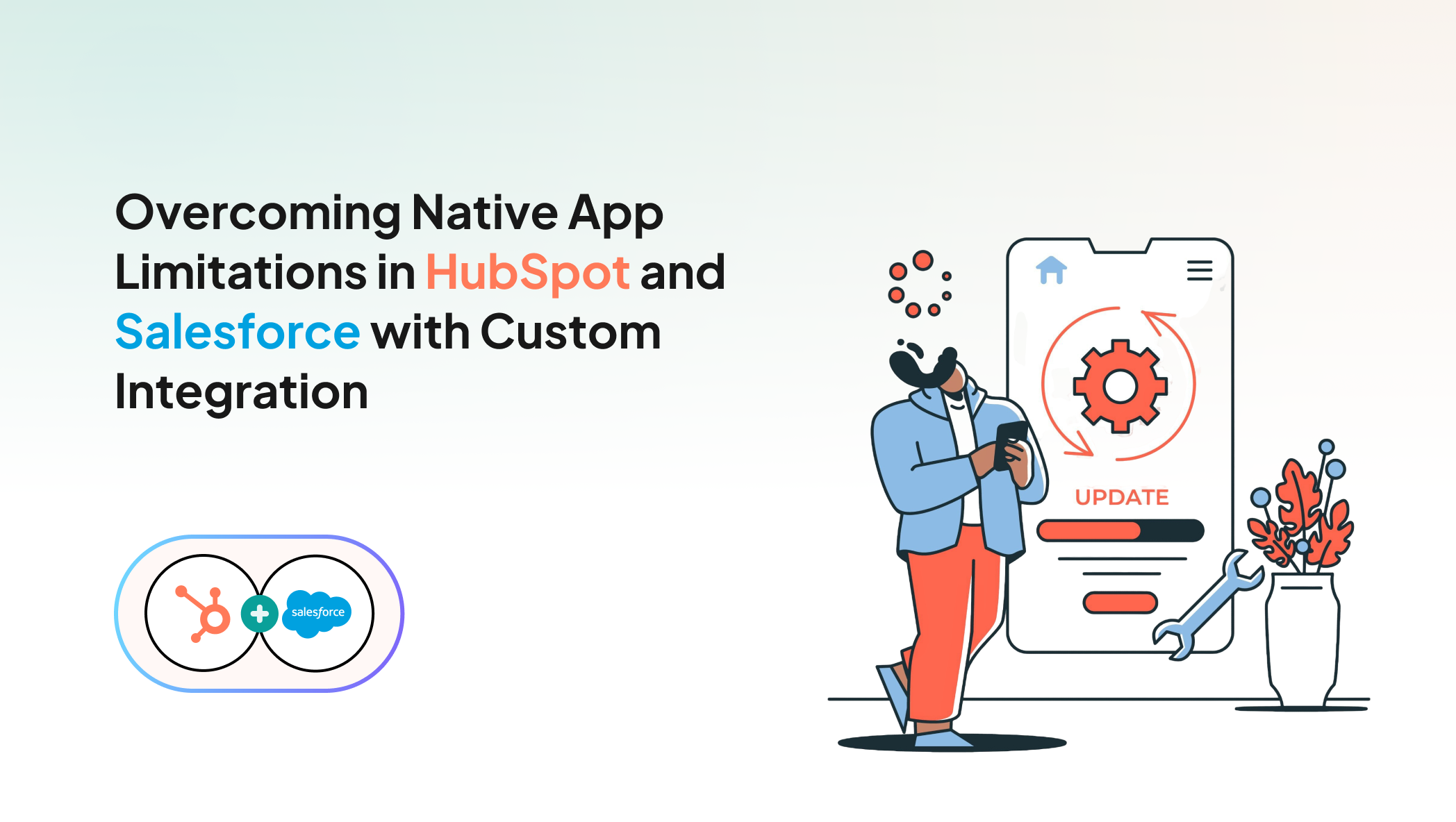Introduction
In today’s digital world, seamless data synchronization between CRM platforms is crucial for businesses aiming to keep their sales and marketing teams aligned. HubSpot and Salesforce are two of the most popular platforms for managing customer relationships and sales data. While HubSpot offers native integrations with Salesforce, the HubSpot Pro version comes with certain limitations that restrict syncing between custom objects. This is where custom integrations, like the one developed by Amwhiz, become essential.
In this blog, we’ll explore the limitations of HubSpot’s native app, discuss how we tackled these challenges, and explain our custom integration solution that ensures seamless data synchronization between Salesforce leads and HubSpot custom objects. We'll also detail how these custom objects are associated with HubSpot contacts, enhancing the functionality for businesses that rely heavily on custom data fields.
Understanding Native App Limitations
The native integration provided by HubSpot is ideal for syncing standard objects, like contacts, companies, deals, and tickets, with Salesforce. However, when it comes to syncing custom objects, businesses using HubSpot Pro face a significant restriction. Custom objects are essential for companies that need flexibility in how they store and manage their data. For example, if your business has specific data points not covered by standard objects, custom objects provide a solution by allowing you to store this information.
But here’s the challenge: HubSpot’s native app for Salesforce integration does not support syncing custom objects. This means businesses can’t automatically sync their Salesforce custom object data with HubSpot, potentially leading to discrepancies and data management issues across platforms.
Our Custom Integration Solution at Amwhiz
At Amwhiz, we understand that custom objects often hold critical data for our clients, which must be kept in sync across both platforms. To solve this problem, we developed a custom integration that ensures two-way sync between Salesforce leads and HubSpot custom objects, with additional association to HubSpot contacts for a more connected CRM experience.
Here’s how we approached the solution:
Two-Way Sync Between Salesforce Leads and HubSpot Custom Objects
The key to our solution was ensuring that updates to leads in Salesforce would be reflected in HubSpot’s custom objects, and vice versa. By setting up custom objects in HubSpot, we allowed the system to handle specific fields and data points unique to the client’s business, which would otherwise be difficult to manage with only standard objects.
Webhook Setup for Real-Time Updates
We implemented webhooks in both HubSpot and Salesforce to listen for property updates. A webhook acts as a notification system, alerting our API whenever there is a change in either platform. These notifications are sent to a custom-built AWS Lambda function (a serverless environment), ensuring real-time data synchronization between the two platforms.
Lambda Function for Data Processing
The Lambda function, written in Node.js, plays an integral role in the sync process. When a webhook notification is triggered (e.g., a Salesforce lead property changes), the function retrieves the updated data, checks the corresponding record in DynamoDB, and processes the update accordingly.
If a corresponding record doesn’t exist in HubSpot, the Lambda function creates a new custom object entry in HubSpot. Similarly, any changes in HubSpot custom objects are captured and synced with Salesforce leads, ensuring data consistency.

DynamoDB for Tracking Records
We used DynamoDB as a persistent data store to track associations between Salesforce leads and HubSpot custom objects. This ensures that every Salesforce Lead ID is mapped to the appropriate HubSpot custom object ID, providing a reliable way to keep both systems in sync. If an update is received from Salesforce, it’s checked against the DynamoDB record, updated in HubSpot, and the same process occurs for changes coming from HubSpot.
Association with HubSpot Contacts
One of the unique aspects of this integration is how HubSpot custom objects are associated with HubSpot contacts. By associating the custom objects with HubSpot contacts, we provide businesses with a more connected and complete view of each customer. This association allows sales and marketing teams to track lead-specific information alongside other contact details, enhancing the team's ability to personalize their outreach and sales strategies.
For example, if a lead’s property changes in Salesforce (e.g., their status or engagement level), this information is updated in HubSpot’s custom object and is immediately available for the associated contact. This integration enables a holistic view of customer data, providing deeper insights into lead behavior and allowing teams to respond more quickly to changes.
Why Choose Amwhiz for Your Integration Needs?
At Amwhiz, we specialize in building custom integrations that help businesses overcome platform limitations and achieve a truly seamless CRM experience. Whether you’re facing challenges with syncing data between HubSpot and Salesforce or need a custom solution for other platforms, our team has extensive experience in designing and implementing tailored integration solutions.
Our proven expertise ensures that your CRM systems work together, so you can focus on what matters most—growing your business.
Conclusion
Navigating the limitations of HubSpot’s native integration can be challenging, especially when your business relies on custom objects. By implementing a custom two-way sync between Salesforce leads and HubSpot custom objects, Amwhiz has helped numerous businesses ensure data consistency and improve their CRM capabilities.
If your business is looking for a reliable solution to overcome platform limitations, or if you need help with custom integrations, Amwhiz is here to assist. With years of experience in API-based integrations, we can help you build the systems that will keep your data flowing seamlessly.
Looking for a tailored integration solution for your CRM? At Amwhiz, we have years of experience in delivering custom integrations that solve complex business challenges. Contact us today to discuss how we can help you enhance your CRM capabilities and ensure your systems are working in harmony.



